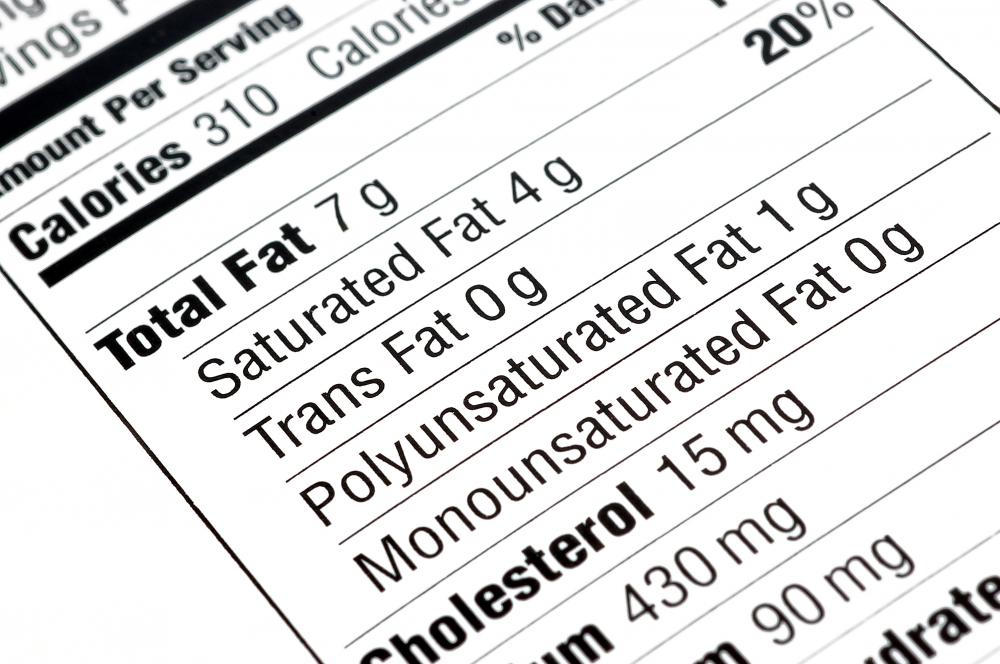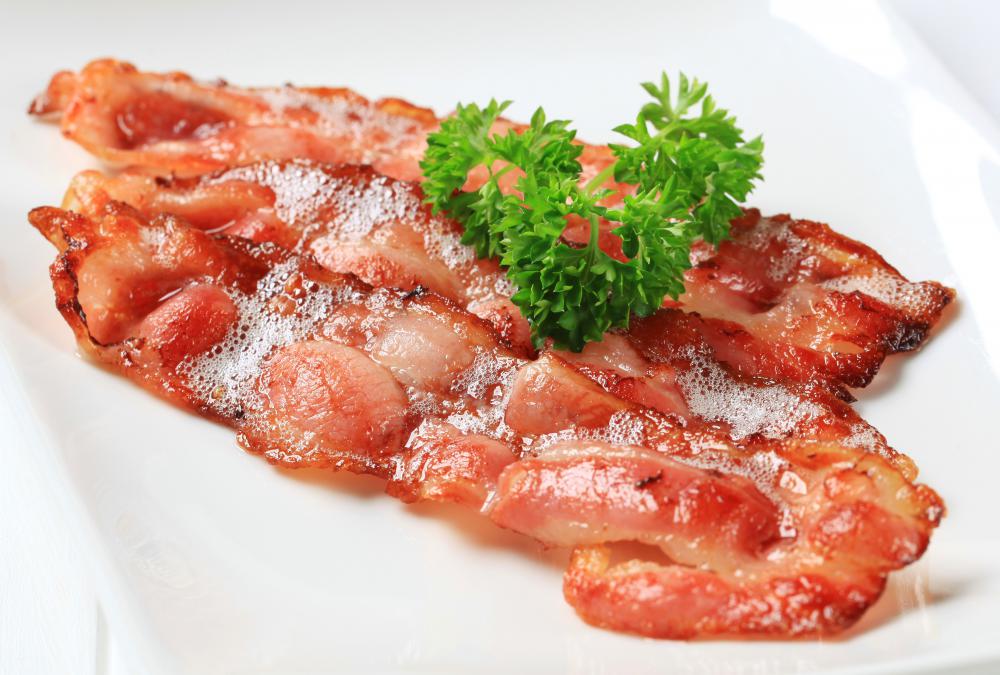At WiseGEEK, we're committed to delivering accurate, trustworthy information. Our expert-authored content is rigorously fact-checked and sourced from credible authorities. Discover how we uphold the highest standards in providing you with reliable knowledge.
Is It Possible to Eat Too Little Fat?
Even when the fad diet pendulum swings back to its high carbohydrate/low fat phase, it is possible for dieters to eat too little fat for good overall health. For some impressionable dieters, fat in any form becomes the thing that must be avoided at all costs, since fat in the food is mistakenly believed to become fat on the body. Because of this irrational fear of dietary fat, some extreme dieters can easily eat too little to maintain vital body functions and processes.
Not all dietary fat is bad for the body, and even the US government's own guidelines recommend that fats should constitute 30% of a person's daily caloric intake. For some dieters following an extreme high carbohydrate/low fat diet, the idea of consuming this much fat may sound counter-intuitive, but anything lower than a 20% daily intake generally means the dieter will not eat enough to meet minimal guidelines.

The side effects of eating too little fat can be just as serious as consuming too much. The body may get a significant amount of energy from carbohydrates such as pasta, but it actually gets better fuel from essential fatty acids and lipids. If dieters eat too little fat, especially the good kinds like unsaturated and monounsaturated fats, they often lose a significant amount of energy throughout the day and, as a result, their metabolism rates may slow, causing the body to store more fat, ironically enough.

When dieters eat too little fat, they may overtax the body's natural glycemic system as well. Fat cells help to keep blood sugar levels from spiking due to excessive carbohydrate and sugar consumption. Without a sufficient number of fat cells and fatty acids, dieters could send themselves into either hypoglycemic or diabetic spikes in blood sugar at unexpected times. When low or no-fat food substitutes are created, manufacturers must replace the fat grams with other ingredients, including sugars and other processed carbohydrates.

Some forms of fat are essential for the formation of healthy nerves and the repair of brain tissue. The body also needs some fat to form protective padding around the joints, the soles of the feet, and the palms of the hands. While it can be a good idea to cut back on the number of saturated and trans fats consumed every day, concentrating on fat grams to the exclusion of all other dietary considerations is not such a good idea. It is definitely possible to not eat enough fat, and dieters should understand the differences between good fats, essential fatty acids, and bad fats.
AS FEATURED ON:
AS FEATURED ON:















Discussion Comments
@ddljohn-- I'm not an expert but as far as I know, that's right.
I can't tell you the difference between saturated and unsaturated fat. But I do know that fatty acids like Omega-3,6 and 9 are really important for us and we need to consume these every day. So the fat in foods like olive oil, nuts and fish are healthy fats and they help our cells function.
@ceilingcat-- Some restrictive diets do work, like low-sugar, low-sodium diets. But restrictive diets that restrict essential nutrients to less than what we need for our body to function never work.
I just found out recently that I have type 2 diabetes. I was given a diabetic diet and my nutritionist told me to stick to lean meats, but to have milk products with the fat in them. So I'm eating whole milk yogurt, organic butter and cheese and 2% milk. She said that this will help balance my blood sugar.
In reality, most of us gain weight because our blood sugar moves up and down too dramatically. So when we do eat, the body stores the energy as fat. Keeping blood sugar stable by eating complex carbohydrates, protein and fat is key to weight loss.
As far as I know, not all fats are the same right?
For example, these days, everyone is talking about saturated fat vs. unsaturated fat and how the former is really bad for us.
So maybe we need to clarify how much of which type of fats we're supposed to consume. We might be consuming enough fat in general, but maybe too little of healthy fats, right?
I have never heard of a low fat/high carbohydrate diet! When I was in high school in the 1990's, I remember the Atkin's diet coming out, and it's still popular. For those who don't know, the Atkin's diet is a low carbohydrate diet, but you can pretty much eat as much fat as you want.
After hearing about the low carb approach to dieting most of my life, the idea of a low fat/high carbohydrate diet sounds a little bit crazy to me. Maybe I've been brainwashed by advertising, but it doesn't sound very healthy to me!
@ceilingcat - I agree that eating sensibly is the best idea for losing weight. I think a lot of people equate fat with bad, and completely forget that fat is an important part of our diet. Our bodies do need some fat in order to function, so trying to limit fat from your diet completely is just ridiculous.
I think it's interesting that eating too little fat can slow down your metabolism, which is the opposite of what most people who eat weight loss food actually want! It just goes to show you that crazily restrictive diets almost never work.
Low fat diets taken to the extreme produce the opposite effect of what most people are hoping for. Very restrictive low calorie diets are basically just people starving themselves!
I definitely think the best way to lose weight is to eat sensibly and work out!
@SilentIce - I never worry about eating too much avocado or eating too many nuts. I say keep these things in the house in decent amounts! It's much better for you to snack on "good fats" than to snack on potato chips and cookies, which aren't good for you in any way.
TwistedTwig- You will want to keep in mind that the amount of fat you need to consume in a day also depends upon how active you are. If you are very active, you will need more fat in your diet to fuel your workouts. You will also burn more fat so you will not gain weight if you consume more.
If you are not very active and do not exercise, you will probably need to consume less fat than the recommendations. You will not be burning fat throughout the day so any fat you eat will be stored in the body and can make you gain weight.
TwistedTwig- How many grams of fat you need each day depends on how much you weigh. It also depends on whether you want to lose weight, gain weight or just maintain your weight.
A woman that weighs about 135 pounds and wants to maintain her weight should consume about 63 grams of fat a day. If she wants to lose weight, she should consume about 55 grams of fat. If she wants to lose weight, she would need to consume about 70 grams of fat.
How many grams of fat does the average woman need to consume in a day?
ivanka- I agree with you that it is beneficial to eat certain kinds of healthy fats but that they should also be eaten in moderation.
To avoid over eating foods such as avocados and nuts, I don't put myself in situations where I know I will be tempted. Don't buy tons of nuts and expect that you will have the control to limit yourself. Only buy an amount to last you a couple of days. If they are not in the house, you will not be tempted to eat them.
Also, nuts are often served at parties and social gatherings. Don't go to a party starving. Eat a sandwich before you go so that you will not over eat at the party.
It is actually beneficial for the heart, and for general well being, to eat healthy fats. Fats found in olive oil, avocados and nuts should be consumed regularly in limited amounts. After all they are calorie dense, but when eaten in moderation they help keep our bodies running and they may even protect us from some diseases.
Post your comments